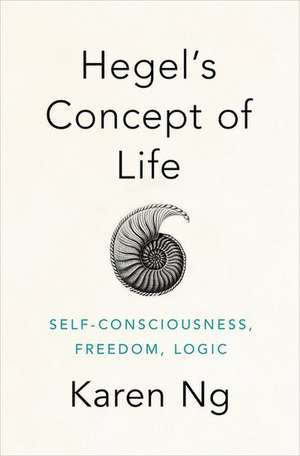Hegel's Concept of Life: Self-Consciousness, Freedom, Logic
Autor Karen Ngen Limba Engleză Hardback – 10 mar 2020
Preț: 514.43 lei
Preț vechi: 682.69 lei
-25% Nou
Puncte Express: 772
Preț estimativ în valută:
98.45€ • 106.90$ • 82.70£
98.45€ • 106.90$ • 82.70£
Carte disponibilă
Livrare economică 21-27 martie
Preluare comenzi: 021 569.72.76
Specificații
ISBN-13: 9780190947613
ISBN-10: 0190947616
Pagini: 336
Dimensiuni: 239 x 155 x 33 mm
Greutate: 0.73 kg
Editura: Oxford University Press
Colecția OUP USA
Locul publicării:New York, United States
ISBN-10: 0190947616
Pagini: 336
Dimensiuni: 239 x 155 x 33 mm
Greutate: 0.73 kg
Editura: Oxford University Press
Colecția OUP USA
Locul publicării:New York, United States
Recenzii
This title was awarded the Journal of the History of Philosophy 2021 Book Prize.
One of the most prodigious works on Hegel, Ng's is a book that will inform Hegel scholarship and scholarship in Idealism for decades to come. Perhaps more importantly, it augments an increasingly compelling basis for the rethinking and reframing of contemporary philosophical issues to capitalize on the dynamic insights of Hegel's thought, helping us to leave farther behind the hackneyed clichés of the formulaic Hegelianism that became commonplace outside Hegel studies. This book is a must for serious scholars on Hegel and for those interested in the philosopher who, more than most in the modern world, substantially influenced an unusual range of academic and sociopolitical movements. Ng's book is a masterpiece.
In Hegel's Concept of Life, Karen Ng tackles head-on the most puzzling element in Hegel's theoretical philosophy: the relation of self-consciousness and life. With subtlety and rigor she fulfills all three desiderata of a new interpretation. She retells the story of Hegel's development and the role of Kant's critical philosophy therein, provides a new reading of the famously enigmatic self-consciousness chapter of the Phenomenology of Spirit, and demonstrates that her reading accounts for the key moves in the final part of the Science of Logic. With her successful integration of the themes of the unity of judgment and the unity of life, Ng sets a new standard for interpreting Hegel's idealism.
In the emerging disputes about the status of Hegel's non-standard naturalism, Karen Ng has found new ground to explore in the relation of Hegel's Logic to Kant's third Critique. She does this convincingly and with great brio. Her book marks a new stage in Hegel scholarship.
In this original, clear and compelling interpretation of Hegel, Karen Ng builds a strong case for a broadly naturalistic account that takes the dynamics of living processes to the very core of his Science of Logic. Far from being some rationalist fantasy, Hegel's logically and metaphysically central notion of "the Concept", by drawing on and transforming ideas from Kant's Critique of Judgment, gives expression to the dynamics of life as the ultimate ground of reason. Such a focus allows us to see a unity within Hegel's method stretching from his early Schelling-inspired critique of Fichte to his later systematic thought. This is a philosophically rich contribution to our understanding of this profound but difficult thinker
Ng's book is an exciting, new, captivating interpretation of Hegel that is at once an original, comprehensive reinterpretation of his philosophy with the potential to fundamentally alter how it is understood.
One of the most prodigious works on Hegel, Ng's is a book that will inform Hegel scholarship and scholarship in Idealism for decades to come. Perhaps more importantly, it augments an increasingly compelling basis for the rethinking and reframing of contemporary philosophical issues to capitalize on the dynamic insights of Hegel's thought, helping us to leave farther behind the hackneyed clichés of the formulaic Hegelianism that became commonplace outside Hegel studies. This book is a must for serious scholars on Hegel and for those interested in the philosopher who, more than most in the modern world, substantially influenced an unusual range of academic and sociopolitical movements. Ng's book is a masterpiece.
In Hegel's Concept of Life, Karen Ng tackles head-on the most puzzling element in Hegel's theoretical philosophy: the relation of self-consciousness and life. With subtlety and rigor she fulfills all three desiderata of a new interpretation. She retells the story of Hegel's development and the role of Kant's critical philosophy therein, provides a new reading of the famously enigmatic self-consciousness chapter of the Phenomenology of Spirit, and demonstrates that her reading accounts for the key moves in the final part of the Science of Logic. With her successful integration of the themes of the unity of judgment and the unity of life, Ng sets a new standard for interpreting Hegel's idealism.
In the emerging disputes about the status of Hegel's non-standard naturalism, Karen Ng has found new ground to explore in the relation of Hegel's Logic to Kant's third Critique. She does this convincingly and with great brio. Her book marks a new stage in Hegel scholarship.
In this original, clear and compelling interpretation of Hegel, Karen Ng builds a strong case for a broadly naturalistic account that takes the dynamics of living processes to the very core of his Science of Logic. Far from being some rationalist fantasy, Hegel's logically and metaphysically central notion of "the Concept", by drawing on and transforming ideas from Kant's Critique of Judgment, gives expression to the dynamics of life as the ultimate ground of reason. Such a focus allows us to see a unity within Hegel's method stretching from his early Schelling-inspired critique of Fichte to his later systematic thought. This is a philosophically rich contribution to our understanding of this profound but difficult thinker
Ng's book is an exciting, new, captivating interpretation of Hegel that is at once an original, comprehensive reinterpretation of his philosophy with the potential to fundamentally alter how it is understood.
Notă biografică
Karen Ng is Assistant Professor of Philosophy at Vanderbilt University. She specializes in nineteenth-century post-Kantian philosophy and Frankfurt School Critical Theory.
